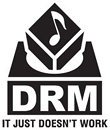Rice University and
Duke University are the latest in a long line of educational institutions to fund research on the effect of using restrictive Digital Rights Management (DRM) to try and control levels of so-called "piracy", which is allegedly reducing sales of content-only, infinite goods/virtual products, such as music, movies, computer games and books. (Some observers writing about DRM replace the word "Rights", giving us the phrase Digital
Restrictions Management, which seems a more accurate description of what it's really about and removes the veneer of legitimacy from it. When buying DRM'd content, you are buying digital handcuffs, nothing more, nothing less.) The universities sponsored a study called
Music Downloads and the Flip Side of Digital Rights Management Protection and what it found is that contrary to popular belief amongst the big content companies, removing DRM can actually
decrease levels of piracy and increase sales. The fact is that DRM is always broken by hackers and pretty quickly too, often within a day or two (there isn't a single one still standing) leaving legal users who work within its confinements with all the restrictive hassles that it imposes, while the pirates get an unencumbered product to do with as they please. How is this progress?













